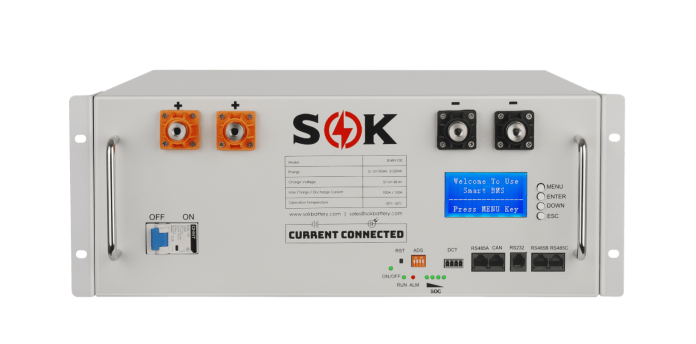Introduction
In the rapidly evolving landscape of data centers and server infrastructure, energy efficiency and reliability have become paramount concerns. As the demand for computing power continues to surge, the need for efficient and sustainable energy solutions has led to the exploration of innovative technologies. One such technology gaining traction is the 48V 100Ah battery system. In this article, we’ll delve into the details of this cutting-edge energy storage solution and explore how it is transforming the server rack landscape.
The Need for Efficient Energy Storage in Data Centers
Data centers are the backbone of modern technological advancements, supporting everything from cloud computing to AI and IoT applications. These centers operate around the clock, consuming significant amounts of energy to ensure uninterrupted services. With energy costs rising and environmental concerns growing, the quest for energy-efficient solutions has led to the development of innovative approaches to power management.
Traditional lead-acid batteries have been the go-to solution for backup power in data centers, but they come with limitations such as bulkiness, weight, and relatively short lifespans. As a result, data center operators have been seeking alternatives that offer higher energy density, longer lifecycles, and reduced maintenance requirements. This is where the 48V 100Ah Server Rack Battery technology steps in.
48V 100Ah Battery Technology: Explained
The 48V 100Ah battery system represents a significant advancement in energy storage for data centers. It is based on lithium-ion (Li-ion) battery chemistry, which offers several advantages over traditional lead-acid batteries. Let’s take a closer look at the key features and benefits of this technology:
Higher Energy Density
Li-ion batteries have a higher energy density compared to lead-acid batteries. This means that they can store more energy in a smaller and lighter package, making them an ideal fit for space-constrained server racks.
Longer Lifespan
Li-ion batteries typically have a longer lifespan than lead-acid batteries, often lasting up to five times longer. This extended lifespan reduces the frequency of battery replacements and associated maintenance costs.
Faster Charging
Li-ion batteries can be charged at a faster rate compared to lead-acid batteries. This is crucial for data centers that need to quickly restore backup power during outages or fluctuations.
Efficiency
Li-ion batteries have higher charge and discharge efficiency, which translates to less energy wasted as heat during charging and discharging cycles. This efficiency contributes to overall energy savings.
Modularity and Scalability
48V 100Ah battery systems are designed with modularity in mind, allowing data center operators to scale their energy storage capacity as needed. This flexibility is crucial for accommodating growth and changing demands.
Enhanced Monitoring and Management
These battery systems often come with advanced monitoring and management capabilities. Real-time data on battery health, state of charge, and performance can help data center operators make informed decisions about maintenance and optimization.
Impact on Data Centers
The adoption of 48V 100Ah battery technology has the potential to revolutionize how data centers manage their power needs. By incorporating these advanced energy storage systems into server racks, data centers can achieve:
Improved Energy Efficiency
The higher efficiency and energy density of Li-ion batteries contribute to overall energy savings, reducing operational costs and environmental impact.
Reliability and Uptime
The longer lifespan and faster charging capabilities of these batteries enhance the reliability of backup power systems, minimizing downtime during outages.
Space Optimization
The compact design of Li-ion batteries allows data centers to optimize their rack space and potentially free up valuable room for additional computing resources.
Scalability
Modularity and scalability ensure that data centers can adapt to changing power requirements without major disruptions.
Challenges and Considerations
While 48V 100Ah battery technology offers numerous benefits, there are still some considerations and challenges to be aware of:
Initial Investment
The upfront cost of Li-ion battery systems can be higher compared to traditional lead-acid solutions, although the long-term savings in maintenance and efficiency can offset this.
Thermal Management
Li-ion batteries are sensitive to temperature fluctuations, requiring robust thermal management solutions to maintain optimal performance and safety.
Safety Measures
As with any energy storage solution, safety is paramount. Data center operators must implement proper safety protocols and measures to prevent overheating, short circuits, and other potential issues.
Conclusion
The rapid evolution of data center technology calls for innovative energy solutions that can meet the demands of efficiency, reliability, and scalability. The emergence of 48V 100Ah battery technology based on lithium-ion chemistry represents a significant step forward in achieving these goals. With its higher energy density, longer lifespan, and advanced management features, this technology has the potential to reshape the way data centers manage their power needs. While challenges exist, the benefits offered by this technology make it a promising choice for ensuring the uninterrupted operation of critical IT infrastructure in the digital age.
